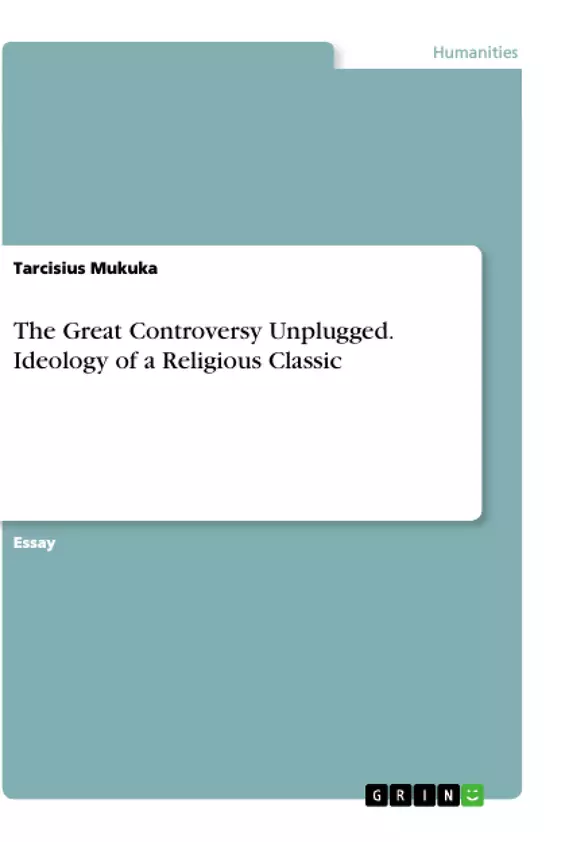This article critiques Ellen G White’s classic, "The Great Controversy", an account of how the conflict between Christ and Satan has panned out in history, beginning with the destruction of the Jerusalem Temple in 70 CE. The article uncovers the ideological underpinnings of The Great Controversy which includes a literalistic approach to apocalyptic literature using the insights of Teun A. van Dijk "Ideology and discourse analysis."
While the hermeneutical vicissitudes of The Great Controversy are understandable in the light of nineteenth century biblical interpretation, the book is open to criticism in the light of the historical-critical method of interpreting scriptures associated with the likes of Hermann Gunkel and Julius Wellhausen, to name two of its progenitors. One way to understand what is going in The Great Controversy is to postulate a literary technique common to the apocalyptic genre of Vaticinium ex Eventu which Ellen G White, along with many of her contemporaries construed as futuristic.
Inhaltsverzeichnis (Table of Contents)
- Introduction
- But First, what is Apocalyptic?
- Ellen G White and Prophetic Authority
- Vaticinium ex Eventu and The Great Controversy
- The Great Controversy Unplugged
- Ideological Underpinnings of The Great Controversy
- First Assumption
- Second Assumption
- Third Assumption
- Fourth Assumption
Zielsetzung und Themenschwerpunkte (Objectives and Key Themes)
This article offers a critical analysis of Ellen G White's "The Great Controversy," examining its apocalyptic framework and ideological underpinnings. It aims to unpack the text's reliance on prophetic authority and the concept of "Vaticinium ex Eventu," while drawing upon contemporary scholarship in biblical hermeneutics and discourse analysis.
- The nature of apocalyptic literature and its role in understanding historical events.
- Ellen G White's prophetic authority and its influence on interpreting "The Great Controversy."
- The application of "Vaticinium ex Eventu" to historical conflicts and its implications for biblical interpretation.
- The ideological underpinnings of "The Great Controversy" and their potential impact on understanding the text.
- The relationship between prophetic revelation, historical context, and contemporary interpretation.
Zusammenfassung der Kapitel (Chapter Summaries)
The introduction sets the stage for a critical analysis of "The Great Controversy," highlighting the sensitivity of the topic given the author's Catholic perspective and the text's status within the Seventh Day Adventist Church.
The first chapter, "But First, What is Apocalyptic?" explores the nature of apocalyptic literature, emphasizing its symbolic language and its historical context. The author argues for a more metaphorical understanding of apocalyptic texts, advocating for a scientific approach to interpreting Scripture, especially regarding “apocalypse.” The chapter uses the Book of Revelation as an example, illustrating how a literal interpretation can lead to misinterpretations.
The second chapter, "Ellen G White and Prophetic Authority," examines the challenges of critiquing a figure like Ellen G White and her book. The author acknowledges the unique status of prophets and their perceived direct communication with the divine, but argues for a more critical approach to understanding prophetic authority.
Schlüsselwörter (Keywords)
Key concepts and keywords include: apocalyptic literature, prophetic authority, Ellen G White, "The Great Controversy," Vaticinium ex Eventu, historico-critical method, discourse analysis, biblical hermeneutics, ideological underpinnings, Seventh Day Adventist Church, Catholic exegesis, biblical interpretation, prophecy, and the Book of Revelation.
Frequently Asked Questions
What is the main focus of "The Great Controversy" by Ellen G. White?
It is an account of the historical conflict between Christ and Satan, starting from the destruction of the Jerusalem Temple in 70 CE.
What does "Vaticinium ex Eventu" mean in biblical interpretation?
It refers to a literary technique where a past event is written as if it were a prophecy of the future, a concept applied in the critique of White's work.
How does the author critique White's literalistic approach?
The author uses the historical-critical method and discourse analysis (Teun A. van Dijk) to argue that apocalyptic literature should be understood more metaphorically.
Why is Ellen G. White's prophetic authority significant?
As a central figure in the Seventh Day Adventist Church, her perceived direct communication with the divine makes critical analysis of her work highly sensitive.
What is the role of symbolic language in apocalyptic literature?
Apocalyptic texts use symbolic and metaphorical language to address historical contexts, which the author suggests can be misinterpreted if taken too literally.
- Quote paper
- Dr Tarcisius Mukuka (Author), 2020, The Great Controversy Unplugged. Ideology of a Religious Classic, Munich, GRIN Verlag, https://www.grin.com/document/955896



